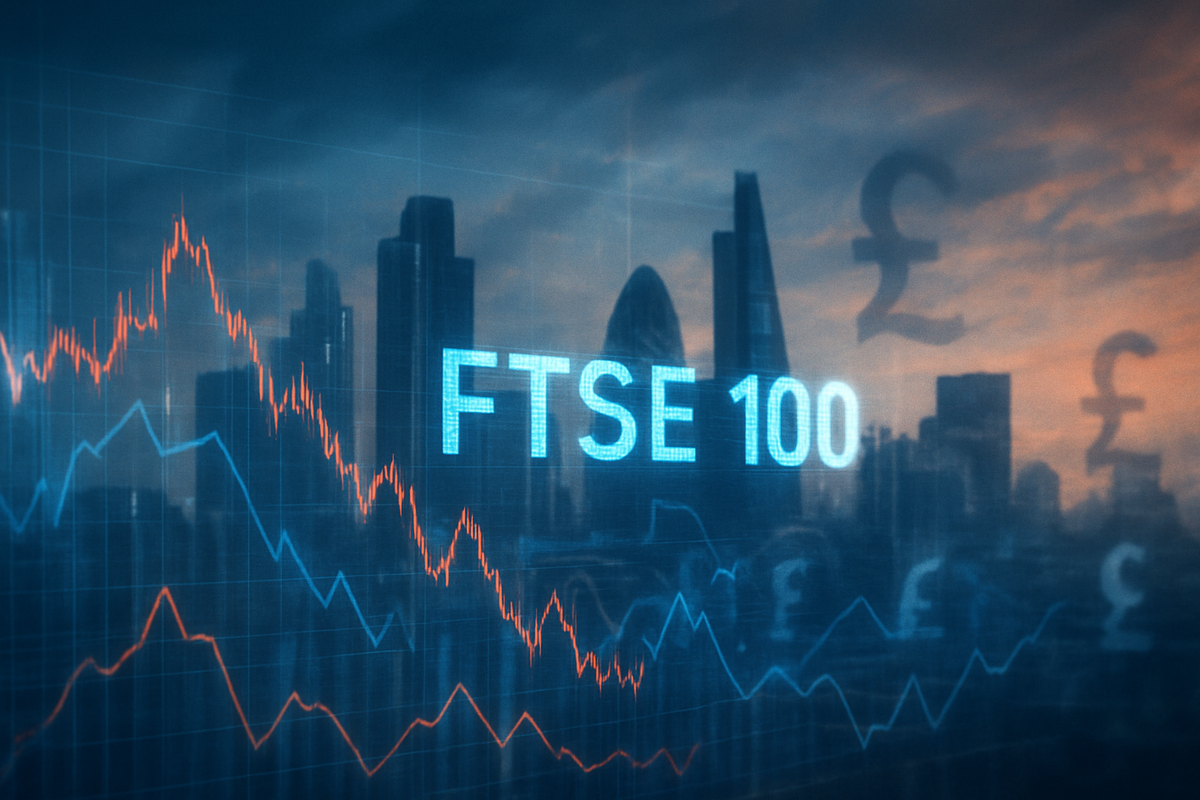
The FTSE 100 has just concluded a tumultuous earnings week, leaving investors with a sense of cautious optimism tinged with indecision. Despite reaching new all-time highs mid-week, the index ultimately lost momentum, pulling back amidst global market jitters. This turbulent period has significantly shaped the immediate outlook for UK stock futures, which appear to be positioning defensively as market participants brace for key economic data and ongoing macroeconomic shifts.
The week culminating around November 9, 2025, proved to be a roller-coaster for the UK's benchmark index. Initially, the FTSE 100 rallied strongly, even touching a new record high of 9,798, buoyed by robust earnings reports from energy giants like Shell (LSE: SHEL) and a resilient banking sector. However, this upward trajectory was short-lived. A significant tech-led sell-off originating from the US, driven by concerns over margin pressure at major technology firms such as Alphabet (NASDAQ: GOOGL) and Meta (NASDAQ: META), sent ripples across global equities. The FTSE 100 subsequently faded, closing the week at 9,741, marking a 0.4% loss and signaling a clear loss of upward momentum.
The corporate earnings landscape presented a mixed bag. While internationally focused firms demonstrated resilience, several domestic sectors faced headwinds. Marks & Spencer (LSE: MKS) reported a significant profit plunge, attributed to a cyberattack, while International Airlines Group (LSE: IAG) noted a slowdown in US travel demand. Rightmove (LSE: RMV) also raised concerns over near-term profitability following plans for increased AI investment. Conversely, Metro Bank (LSE: MTRO) provided a positive update, showcasing pockets of strength within the broader market. This diverse performance underscores the selective nature of investor confidence in the current environment.
Companies Navigating the Storm: Potential Winners and Losers
The turbulent earnings week has created a distinct divide among companies within the FTSE 100, highlighting those poised to potentially gain and those facing significant challenges. The "flight-to-quality" theme observed during the week suggests a rotation into more defensive sectors, which traditionally fare better during periods of market stress.
Energy heavyweights, such as Shell (LSE: SHEL), along with the broader banking sector, demonstrated strong earnings and resilience, positioning them as potential winners. Their robust performance provided initial upward momentum for the index, and in a cautious environment, their stable cash flows and dividend yields can attract investors seeking safety. Similarly, other defensive stocks within consumer staples and utilities are likely to see continued interest as investors de-risk their portfolios. The FTSE 100's heavier weighting in these traditional sectors has contributed to its relative strength compared to some of its more tech-heavy European peers.
On the other hand, companies like Marks & Spencer (LSE: MKS), grappling with a significant profit plunge due to a cyberattack, and International Airlines Group (LSE: IAG), facing a slowdown in key travel markets, exemplify potential losers. Their vulnerabilities, whether operational or demand-driven, have been exposed during this period. Furthermore, growth-oriented companies, particularly those with high valuations like Rightmove (LSE: RMV), which is planning substantial AI investments impacting near-term profitability, may struggle as investors become more risk-averse and scrutinize future growth prospects more critically in the wake of global tech sector jitters.
Wider Significance: Macro Trends and Policy Crossroads
This turbulent week for the FTSE 100 is not an isolated event but rather a microcosm of broader industry trends and macroeconomic shifts. The global market jitters, particularly the tech-led sell-off in the US, underscore a re-evaluation of technology valuations and growth prospects worldwide. This has prompted a significant rotation of capital from growth-oriented assets to more value-oriented and defensive stocks, a trend that the FTSE 100, with its heavier weighting in traditional industries, has partially benefited from.
The Bank of England's recent decision to hold interest rates at 4% last week, accompanied by a higher-than-expected number of Monetary Policy Committee (MPC) members voting for a cut, signals a dovish stance. This suggests a likely "gradual downward path" for rates, which could have significant ripple effects across the economy and financial markets. A sustained period of lower rates could eventually stimulate economic activity, but also impact bank profitability and bond yields. This policy pivot fits into a broader global trend where central banks are balancing inflation concerns with the need to support economic growth amidst slowing demand.
Historically, periods of market stress and mixed corporate earnings often precede significant policy shifts or economic turning points. The current environment echoes past instances where investors sought refuge in defensive assets while awaiting clarity on monetary policy and economic direction. The upcoming UK Budget on November 26th, potentially including personal taxation rises, adds another layer of political and fiscal uncertainty, which could further influence market sentiment and investor behavior, potentially impacting consumer spending and corporate investment.
What Comes Next: Navigating Uncertainty
Looking ahead, the immediate future for the FTSE 100 and UK stock futures is characterized by a blend of caution and anticipation. A positive start to the new week, commencing November 10th, is viewed as "a little bit more risky," despite some bullish technical indicators from the previous Friday's trading.
Market participants will be keenly focused on crucial UK economic data releases in the coming days. Average earnings data, due on November 11th, and Q3 GDP figures, expected on November 13th, will be pivotal in shaping expectations for the Bank of England's next moves regarding interest rates. Any signs of weakness in inflation-related data could strengthen the case for a December rate cut, potentially providing a catalyst for a market rally. Furthermore, significant Q3 earnings reports from heavyweights like BP (LSE: BP) and AstraZeneca (LSE: AZN) are on the horizon and will be critical in determining the index's momentum. The looming UK Budget on November 26th introduces an element of political uncertainty, with potential personal taxation rises that could impact consumer sentiment and overall economic activity.
In the long term, the FTSE 100 continues to be seen by some as relatively undervalued compared to its international counterparts like the S&P 500 (NYSEARCA: SPY), offering attractive valuations and a compelling dividend yield. This could present market opportunities for contrarian investors seeking long-term growth amidst short-term skepticism. However, adapting to potential strategic pivots by companies facing changing consumer demands and technological advancements will be crucial. Potential scenarios range from a sustained recovery if economic data surprises positively and central banks remain dovish, to continued volatility if global headwinds persist and domestic policy creates further uncertainty.
Comprehensive Wrap-up: A Market in Flux
The turbulent earnings week has provided a stark reminder of the complexities and interconnectedness of global financial markets. Key takeaways include the FTSE 100's underlying resilience in defensive sectors despite a broader loss of momentum, the significant impact of global tech sector jitters, and the pivotal role of central bank policy and upcoming economic data.
Moving forward, the market is poised at a crossroads, influenced by both domestic policy decisions and international economic currents. The Bank of England's dovish stance offers a glimmer of hope for a supportive monetary environment, but this must be balanced against potential fiscal tightening from the UK Budget and ongoing global uncertainties. Investors should watch for the upcoming economic data releases, particularly average earnings and GDP figures, as these will heavily influence the Bank of England's trajectory. Corporate earnings from major players like BP and AstraZeneca will also provide crucial insights into sectoral health.
The FTSE 100's technical outlook, with key support levels identified at 9,600 and 9,500 and psychological targets at 9,800, 9,900, and 10,000, suggests a potential for upside if positive catalysts emerge. However, the prevailing sentiment remains one of caution. The lasting impact of this period will likely be a renewed focus on fundamental value, defensive positioning, and a keen eye on macroeconomic indicators as the market seeks a clearer direction in the coming months.
This content is intended for informational purposes only and is not financial advice







